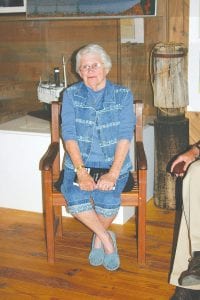How old was Betty Sivertson Strom when she first boated to Isle Royale where her dad was a commercial fisherman? “I was a tummy lump under my mom’s apron,” she told a group of fascinated listeners on May 21, 2011 at the Tofte Fishing Museum.
When she wasn’t on Isle Royale, Betty and her brother Howard lived in Two Harbors and went to school in Duluth. She has fond memories of island life, but it wasn’t all easy. Betty remembers lots of planning and packing before leaving for summers on the island. She always felt “shivery and cold” as they made their way across the Big Lake. She and Howard would get seasick. On the island, they had no electricity or running water.
Once they were there, they lived on her mother’s homemade bread, baked in the wood cook stove, and the preserves she had in the storehouse— that and fish, of course. Betty remembers her mother serving lunches of canned tomatoes with crackers to tourists on day trips. And she remembers lemon pudding. “We really felt like we were different from most people,” she said. “Really we didn’t mind. We thought we had it better than most people.”
Betty remembers looking for worms under rocks and chubs under the docks. The kids once made an aquarium “where rain collected in a rocky place,” she said. They put chubs in it and were delighted the next summer when the chubs had babies. Unfortunately, the seagulls found them and decimated the colony.
Betty used to play house in the barn, using orange crates for cupboards and sticking her cousin Dick Eckel in an old metal crib. “He got to be the baby,” she said. “If he ever has any psychological problems, it’s our fault!”
“We were never still for a very long time,” Betty said. “Our mother never heard us say, ‘We’re bored! What can we do?’”
The kids worked as well as played. They had to rub corks and make fish boxes. She hated sliding nets out on the lake with her dad because it gave her blisters. Someone asked Betty if she had to cook and clean, too. “Oh, yes, all the time,” Betty answered.
Every morning Betty’s mother would make lunches for her dad and his two helpers while they shaved—in the kitchen. Every lunch had a sandwich on homemade bread, something sweet, and a thermos of coffee. Betty said she didn’t know until she was 83 that “thermos” wasn’t pronounced “ter-mus.”
Betty’s grandma across the way had a washing machine. That was a good thing, but then they had to lug the wet laundry home from Grandma’s, across the water, and up the dock to the house. Her mom never liked Isle Royale very much.
Every child knew the sound of his or her dad’s boat motor. When they heard their dad’s motor at the end of the day, Betty and Howard would run and tell their mom to get the potatoes on, because Dad was on his way.
Every night her mother would chase the mosquitoes away with stinky kerosene smoke. They would go to bed when the mosquito noise died down.
Many others lived on the island, but Betty didn’t get to visit all of them because getting from one place to another took a long time, and visiting took her dad away from his fishing. Booth Island, with its rocky shoreline dotted with little Scandinavian-looking houses, was one of her favorite places. The Old Country wasn’t too far away in some respects – the adults would talk to each other in Norwegian, and the children wouldn’t know what they were saying.
Times changed, however. Somewhere around 1939, Betty said, the National Park Service claimed the land that all the families lived on. “It cut into the family life when the park took over,” Betty said. Her father had only known the fishing industry. While he received a life lease on Isle Royale, restrictions on commercial fishing meant that he had to figure out how to make a living elsewhere. When he stopped spending the entire summer on the island in order to work his business in Duluth, he lost his special use permit on Isle Royale.
Betty’s memories of Park Service employees are dark. They had “ugly uniforms,” she said, and were very authoritative. They came in and measured their walls and took pictures of their house. Homes were burned down to return the island to wilderness conditions. “It was hard times and hard feelings between the people and the government,” Betty said. Many of the settlers were Scandinavians who “came here for the Golden Streets,” she said, “and got the National Park Service.”
The Park Service is in the process of enforcing its claim on the properties where family cabins still stand, although a cultural study is under way that could lead to continued rights to use family homesteads and preserve them for posterity.
Betty returned to spending her summers on Isle Royale in 1982 and lives in Cross Lake, Minnesota the rest of the year. Over the course of 26 years, she wrote a book about life on the island, Isle Royale…from My Point of View (available at the Tofte Fishing Museum), to preserve her memories for her children and grandchildren. When the family is there, they eat their meals together, they have picnics, the kids and grownups interact. And there’s no TV. Once she asked her 12-year-old grandson what he liked most about Isle Royale. “Gram,” he said, “I think it’s peace.”



Leave a Reply